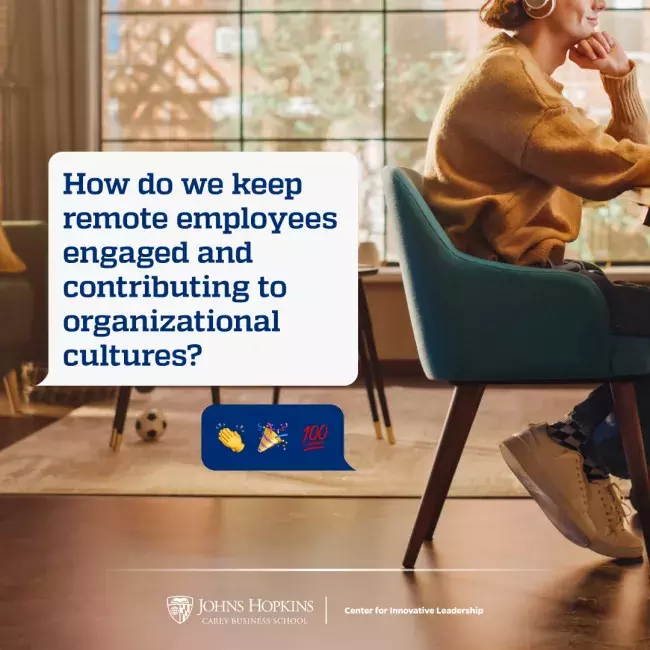Online knowledge-sharing communities such as ‘Stack Overflow,’ which add billions of dollars of value in increased productivity, provide rich data sets around motivating collaborative behaviors and evidence on the pros and cons of nonmonetary reward systems, a tool used to motivate remote employees

Remote Workforce Leadership Lessons from Online Collaboration Communities
Summary: How do we keep remote employees engaged and contributing to organizational cultures? Offering nonmonetary rewards such as badges, titles, and recognition, are one way of highlighting remote employees’ contributions. However, these awards can sometimes increase competition and lead to counterproductive behavior that must be sanctioned. A new research study uses data from online communities to examine how nonmonetary reward systems and sanctions affect remote members’ motivations to contribute. Its findings support the use of nonmonetary reward systems to sustain voluntary contributions in online communities but offers a note of caution regarding some unintended consequences and the falloff in contributions associated with the imposition of sanctions.
The flow of knowledge in online communities
The development of online, often open access, communities—widely used in scientific research and software development—has been one of the major benefits of the digital age. The open-source software model, the crowdsourcing of inventions, the maintenance of compendiums such as Wikipedia, are all popular examples of online communities where openly shared ideas, knowledge, and solutions, supplied voluntarily and then filtered through a crowd to identify superior insights and innovative ideas, create a valuable resource. Typically, community interaction follows a question-and-answer format, allowing members to post questions or problems to be solved, which other members respond to, developing a dialogue from which answers and resolutions to problems emerge.
As well as the popular open communities, many special interest online communities also exist, serving professional, scientific, and academic groups, bringing together individuals, often from around the world and with diverse perspectives, who are enthusiastic about a specific domain of knowledge. Online communities are also employed in many workplaces, where they can be an effective way to collect, store, and transmit knowledge across an organization, making connections both internally or with customers and other stakeholders.
The success and quality of these communities depends on the ongoing participation of knowledgeable contributors. An individual’s desire to participate may come from personal identification with the community and goodwill towards its aims, or from the prestige associated with being an acknowledged contributor. Initial enthusiasm may however wain as the costs associated with monitoring, posting, editing, and updating material become apparent, or when the value of knowledge imparted does not appear to be reciprocated. When this happens community members can be tempted to maximize their own interests by accessing the community’s knowledge while avoiding related costs. As a result, many open collaboration initiatives suffer from low quality or frequency of contributions.
Motivating collaboration
Individuals can be motivated to expend the effort required to make valuable contributions for both intrinsic and extrinsic reasons. Intrinsic motivators include personal identification with the content and community, personal learning needs, a desire to repay others for their help, furthering community aims as a source of public good, or just pure enjoyment of the contribution process. Extrinsic factors motivate individuals to make contributions to achieve outcomes such as increased professional reputation and status, enhanced employment prospects, or greater respect and influence in the eyes of peers.
To avoid a falloff in contributions, many online communities offer extrinsic motivators in the form of nonmonetary rewards that use peer recognition of quality to award points, badges, and other forms of status to acknowledge members’ contributions. The reason reward systems can be effective is that, although voluntary online communities do not involve any financial incentives, they are able to generate performance pressures stemming from members’ desires to achieve the prestige associated with being recognized as a high-quality contributor.
Nonmonetary reward systems aim to align individuals’ self-interests with the collective’s interests, unfortunately however, because the peer recognition associated with a publicly acknowledged award has a value, some community members under performance pressures may be tempted to engage in counterproductive behaviors to game the system. Context will modify performance pressures (e.g., contributors to a public community, with millions of members worldwide will be rendered more anonymous than members of a close academic community, and so be less pressured or inclined to cheat). To counter bad behavior, in algorithmically maintained, nonmonetary reward systems, such as that employed by the popular online programming community Stack Overflow, sanctions are applied in the form of members’ suspensions.
Studying nonmonetary reward systems
Considering how to best design open collaboration environments to realize the potential associated with crowdsourced knowledge and collaboration, a recent study from Cassandra Chambers, an assistant professor at the Johns Hopkins Carey Business School, accepts the need for nonmonetary reward systems, yet highlights some previously underappreciated downsides. Previous research has identified a significant positive relationship between nonmonetary rewards and individuals’ voluntary contributions to online communities. For her research, Chambers monitored the movements and behaviors of members of the Stack Overflow community—said to have added billions of dollars of value in increased programmer productivity—to determine how member suspensions or the threat of them influenced the incidence of productive and counterproductive behavior.
In this context, counterproductive behavior is any behavior that advances the interests of the individual at the expense of the collective’s shared goals, the quality of the community resources, and other members experience. In many spheres, counterproductive behaviors are known to increase in the presence of performance pressures and competition. The symbolic awards, associated with nonmonetary reward systems may trigger counterproductive behaviors, leading individuals to overly focus on elements that increase their eligibility for an award at the expense of intrinsic motivation and the actual quality or veracity of their contributions—in extreme cases leading to a willingness to sabotage competitors and overstate their own performance. Such behavior can harm the collective by decreasing confidence in the efficacy of the reward system, setting off a ‘race to the bottom’ as members decline to contribute.
The study found that being close to the threshold for achieving a milestone reward increased the likelihood of suspension for counterproductive behavior—reward thresholds, the very elements of a nonmonetary reward system that are thought to be most effective at boosting performance, can be sources of counterproductive behavior. Conversely, members also increase productive contributions near the time of their suspensions, which may help offset their counterproductive behaviors. The study also found that formal suspensions for counterproductive behavior negatively affected individuals’ subsequent rates of contribution. These findings suggest that online communities do produce performance pressures that trigger counterproductive behaviors, but these behaviors do not occur at the expense of productive contributions. Individuals, however, contribute at lower rates after suspension, suggesting that other methods rather than formal sanctions should be deployed to deter counterproductive behavior.
Leadership lessons ahead
Designers of online communities or remote work environments, seeking to incentivize contributions should consider the potential for negative externalities, and create nonmonetary reward systems that offset or remove these negative elements. For example, as individuals near a reward threshold, the system could feature cues of appreciation and recognition or alert individuals to ways in which they could uniquely be of help to others. A renewed focus on others may reduce performance pressures, and emphasize the importance of a norm to contribute when it may be most vulnerable.
For leaders managing collaborative teams in offline face-to-face settings it is interesting to consider what lessons from the online space might be applied to the practice of rewards and sanctions in motivating collaborative behavior in other contexts.
The Center for Innovative Leadership (CIL) at the Carey Business School aims to advance knowledge and build capacity for innovative leadership in modern organizations. CIL is a hub for new ideas and insights on leadership, combining faculty-led research, student-facing programming, and community-focused impact.


